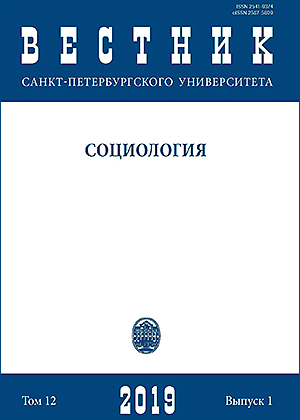Public perception of corruption level in professional spheres
DOI:
https://doi.org/10.21638/spbu12.2019.104Abstract
The article discovers the sociological approach of the phenomenon of everyday corruption as an established practice, which citizens resort to when applying to state institutions for a particular service. Within the article, the author analyzes the socio-economic factors that contribute to the reproduction of corruption in society, based on the ideas of constructivism, social exchange, justice and trust in sociology. Consideration of everyday corruption in professional spheres is a visible indicator of people’s distrust of state bodies, from one point of view, low quality of public services, from the second point, and reproduction of the social image of a bribe-taker official, from the third one. The article presents the results of a sociological study of the perception of corruption by residents of St. Petersburg and the Leningrad Region, conducted in 2018 with the participation of the author. As a result of the comparison of the data obtained with other regional research, the author has formulated a number of factors contributing to the reproduction of corruption practices in these particular areas. An important result of the research, which can find its practical development, was the conclusion about the imperfection of the regulatory law framework, interdisciplinary work on which will become an important tool for overcoming the negative practices of everyday corruption.
Keywords:
corruption, a perception of corruption, domestic corruption, trust, justice, legal culture
Downloads
References
References
Downloads
Published
How to Cite
Issue
Section
License
Articles of "Vestnik of Saint Petersburg University. Sociology" are open access distributed under the terms of the License Agreement with Saint Petersburg State University, which permits to the authors unrestricted distribution and self-archiving free of charge.




